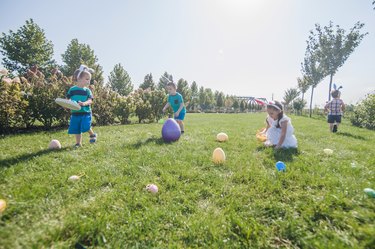
Although Easter is one of the two major Christian holidays, one of its biggest traditions, the Easter Egg Hunt, has nothing to do with Christianity. In fact, the Easter Bunny and Easter Eggs are linked to Pagan traditions. But however you look at it, the Easter Egg Hunt is a beloved event for kids everywhere. Here's how the tradition began.
The Easter Bunny: A Brief History
Video of the Day
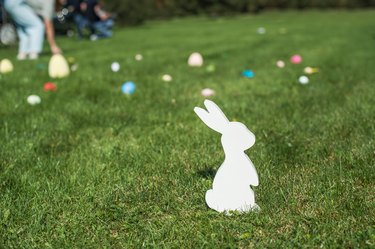
There wouldn't be an Easter Egg Hunt without the Easter Bunny, so to understand the origins of egg hunting, we must first look at why bunnies are associated with Easter.
Video of the Day
Known for their prolific procreation, rabbits have long been a symbol of fertility. In fact, rabbits were the sacred animal of the Saxon goddess of spring and fertility.
The Easter Bunny legend started long ago in Germany with an egg-laying hare named "Osterhase." German children made nests and left them outside for the hare to lay her eggs in.
Why Are Eggs Associated with Bunnies?
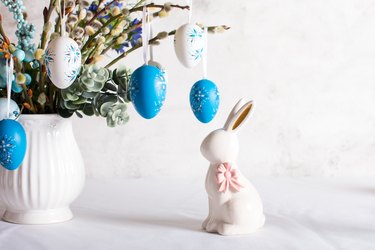
The idea of an egg-laying rabbit might have started with the Romans, who believed that all life came from eggs.
Another link between the rabbit and the egg comes from Pagan traditions, in which the rabbit was associated with the moon and the egg with the sun. On the spring equinox, when day and night are the same length, the rabbit and egg come together.
Eggs and rabbits have also long been a symbol of fertility. With spring symbolizing renewal and rebirth, it makes sense to incorporate eggs and bunnies into the theme of the season.
Easter Egg Hunting History
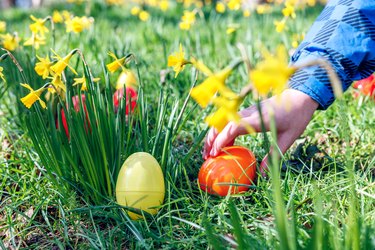
Easter Egg Hunting began in America when German immigrants brought their Osterhase tradition to Pennsylvania in the 1700s. The festivity soon spread across the nation, and Easter baskets replaced the nests used by the Germans.
Eventually, the game evolved into a treasure hunt, and the prizes expanded from just hard-boiled eggs to include chocolate, candy, toys, and coins. In many families, the Easter Bunny leaves a basket filled with gifts, not just eggs to find.
Why Are Eggs Associated With Easter?
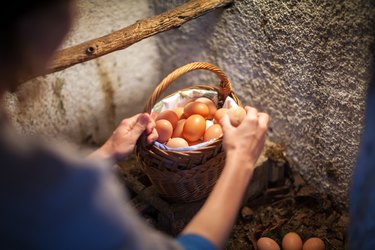
Since ancient times, eggs have been seen as a symbol of new life for obvious reasons. They have been associated with Pagan spring festivals throughout history.
In ancient times, eating eggs was forbidden during Lent, which is the 40 day stretch before Easter. On the holiday, those who celebrate could once again eat eggs, so eating eggs on Easter became a tradition.
The History Behind Decorating Eggs for Easter

Decorating eggs for Easter probably began in the 13th century, when eggs (in addition to meat) were forbidden during the Christian Lent season, which ends on Easter. To mark the end of the time of penance and fasting, people painted and decorated eggs before eating them.
Some historians believe that the tradition of decorating eggs has ancient roots in Persia and Zoroastrianism — colored eggs appeared on the altars made for the Persian new year celebrated at the vernal equinox.
For centuries, parents emptied raw eggs and dyed the eggshells or dyed hard-boiled eggs for their children to find. Some also hand-painted the eggs with elaborate designs.
Today, the colored egg has evolved into a plastic egg that you can hide a small treat inside. Easter egg hunts involve hiding these colorful plastic eggs outside for children to find and collect in baskets.
Other Fun Easter Traditions
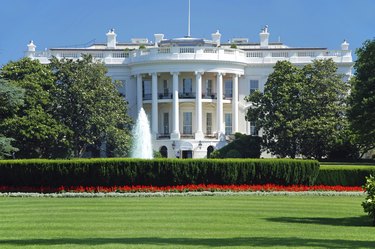
Another popular Easter tradition is the Easter Egg Roll, where kids roll an egg across a lawn or down a hill. The famous White House Easter Egg Roll began in 1878.
Egg tapping, also known as egg fighting or egg knocking, is another Easter tradition celebrated across the world. In egg tapping, each person holds a hard-boiled egg. Using their egg, players tap other players hard-boiled eggs in an effort to break them without breaking their own first. The last person with an unbroken egg wins the game.
A cascarón, Spanish for eggshell, is another Easter tradition. It's a hollowed-out egg filled with confetti or small toys, similar to a piñata.